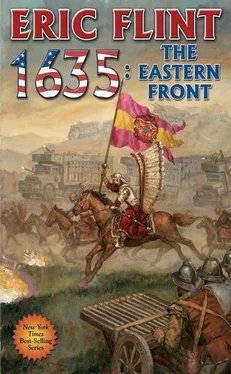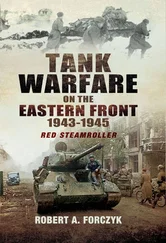Eric Flint - 1635 - The Eastern Front
Здесь есть возможность читать онлайн «Eric Flint - 1635 - The Eastern Front» весь текст электронной книги совершенно бесплатно (целиком полную версию без сокращений). В некоторых случаях можно слушать аудио, скачать через торрент в формате fb2 и присутствует краткое содержание. Жанр: Альтернативная история, на английском языке. Описание произведения, (предисловие) а так же отзывы посетителей доступны на портале библиотеки ЛибКат.
- Название:1635: The Eastern Front
- Автор:
- Жанр:
- Год:неизвестен
- ISBN:нет данных
- Рейтинг книги:5 / 5. Голосов: 1
-
Избранное:Добавить в избранное
- Отзывы:
-
Ваша оценка:
- 100
- 1
- 2
- 3
- 4
- 5
1635: The Eastern Front: краткое содержание, описание и аннотация
Предлагаем к чтению аннотацию, описание, краткое содержание или предисловие (зависит от того, что написал сам автор книги «1635: The Eastern Front»). Если вы не нашли необходимую информацию о книге — напишите в комментариях, мы постараемся отыскать её.
1635: The Eastern Front — читать онлайн бесплатно полную книгу (весь текст) целиком
Ниже представлен текст книги, разбитый по страницам. Система сохранения места последней прочитанной страницы, позволяет с удобством читать онлайн бесплатно книгу «1635: The Eastern Front», без необходимости каждый раз заново искать на чём Вы остановились. Поставьте закладку, и сможете в любой момент перейти на страницу, на которой закончили чтение.
Интервал:
Закладка:
Demonstrating once again his seemingly bottomless stupidity, John George had accepted the offer and placed Holk in charge of "maintaining order" in the Vogtland. Since then, Holk-a man sometimes described as a one-eyed, drunken mass murderer-had turned the unrest in the Vogtland into outright rebellion with his rapacious brutality.
Holk's army was notorious for committing atrocities, and there was no reason to believe that deserters from that army would be any less vicious. A large part of Kresse's success in withstanding the pressure of the Saxon elector's forces was that he had the firm support of the farmers and townsmen in the Upper Vogtland. That support, in turn, was contingent upon Kresse's ability to protect them from the sort of freebooting raids that had become all too common in the course of the long war in the Germanies. Most soldiers were mercenaries and many of those mercenaries were barely more than bandits. Holk's men were a particularly brutal bunch, but they were by no means unique.
Harsh he might be, but Georg Kresse was neither careless nor reckless. He spent three days preparing the attack on the band of deserters. Part of the reason for the delay was because he didn't want anyone associating the attack with the whereabouts of the mine. If need be, Kresse's people could relocate easily enough. They'd done it several times over the past few years. But the abandoned mine was the best of all the bases they'd had, and Kresse didn't want to lose it.
Mostly, though, the delay was simply because Kresse was an experienced commander of irregular forces engaged in the sort of combat that the Americans apparently called "guerrilla warfare." As if a peculiar-sounding Spanish term was needed to depict what was blindingly obvious to any sensible German farmer or townsman! Kresse was always careful to keep his own casualties to a minimum, even when facing a group of undisciplined deserters who didn't number more than perhaps three dozen all told.
One of the methods he used to keep his casualties low was to maneuver his foes in such a way as to take advantage of the local militias. Almost every town and village of any size in the Germanies maintained a militia force. They were often quite effective, within their limits-and the limit was that they generally fought well on the defensive, especially behind fortifications of some sort, but were inept if they were forced to fight in the open field.
Kresse and his men were quite effective in the open field, on the other hand. Kresse used the fortified villages as so many anvils, and used his own troops as a hammer. Against a large force of regular soldiers, such tactics wouldn't succeed. But they worked very nicely against smaller units or simple marauders.
Kresse had the Holk deserters under constant observation throughout those three days. His own scouts provided him with some of that intelligence, but more was provided by the villagers in the area through which the enemy was moving. At least half a dozen times a day some young lad from one of the villages would come racing up-"racing," insofar as the term could be applied to a village plow horse-to report on the latest movements of the mercenary band. The youngsters were far more excited than they were scared. Partly that was because they were teenagers, but mostly it was because over the past few years Kresse and his men had demonstrated their capabilities many times.
Kresse liked to attack at first light. His own people knew the area quite well-certainly better than their enemies-and so moving into position under cover of darkness was not too difficult. Only the most disciplined military units kept proper vigilance through the night. Deserters like these would only maintain a small number of sentries, and those would most likely be careless.
Wilhelm Kuefer's task was harder, in terms of sheer effort, since Kresse had given him the assignment of bolstering the militia forces with one of their handful of cannons. The largest cannon in their possession was a demi-culverin with a four-inch bore, but the gun taken by Kuefer on this occasion was a smaller Spanish-built five-pounder saker. Even the saker weighed almost a ton, despite having a bore not much more than three inches. Hauling it through the mountains was no one's idea of a pleasant outing.
On the other hand, Wilhelm and his squad had left a day earlier and were taking a more circuitous route to the selected ambush spot. So, unlike Kresse and the rest of their forces, they'd been able to move in daylight. They hadn't had to worry about moving quietly, either, which was fortunate. The horses didn't like the saker one little bit, so it required a fair amount of cursing to keep them to the task.
Again, experience counted. Kresse's little army of irregulars had captured quite a few cannons over the years. But they'd learned long since to just destroy-or better yet, sell if they could find a neutral buyer-any guns larger than demi-culverins. Even the smallest full culverin weighed two tons. A cannon that large and heavy was just too difficult to maneuver through the rough terrain of the Upper Vogtland, without having the resources of a large professional army.
When he arrived, Wilhelm was pleased to see that the militiamen had already constructed an abattis to block the road. The militias from three of the local villages would wait in ambush while Kresse and his men drove the Holk deserters toward them. The road had steep slopes on either side here, as it passed through a crest in the mountains. It would be hard to scramble up those slopes while under fire.
The abattis was a sturdy thing. Not up to the standards of a professional army with a corps of engineers, of course, but it was far more than just a haphazard pile of branches and brambles. The war that had raged in central Europe since the Bohemian incident had been going on for seventeen years. Villagers such as these were experienced by now with jury-rigged fieldworks.
This was a well-chosen spot for an ambush in other respects, too. The ambush site was not right on the crest but forty yards below it, just after a bend in the road. Holk's deserters, as they came rushing over the crest, wouldn't spot the abattis until they were within fifteen yards of it. They'd be coming downhill, so the men in front would have a hard time preventing those behind them from piling up.
A pity, of course, that the abattis had to be half-disassembled in order to make room for the cannon. But the militiamen didn't grumble at the added work. As usual, the cannon was proving to be a tremendous morale-booster. Only the militias of the larger towns had such guns. Villages in the mountains rarely even saw the weapons. The fact that Kresse's men possessed several was an important factor in establishing their reputation as a serious military force.
On the positive side, the hand guns owned by the villagers were actually better than those of most soldiers, even regular forces. They were rifles, for the most part, not smoothbore muskets. Far more accurate, especially in the hands of men who'd been hunting all their lives.
Their great limitation on a battlefield was their terribly slow rate of fire compared to smoothbore muskets. That was the reason that professional armies generally used muskets. Wilhelm had heard that the Americans had introduced a method for rapidly rearming front-loading muskets. It involved something called a Minie ball. But he'd never seen one and had no real idea how it was done.
For an ambush like this, however-with Kresse and his men in hot pursuit of the enemy-the villagers didn't really need to worry much about reloading quickly.
Wilhelm Kuefer had participated in many fights under Kresse's command. He knew Georg would launch a savage assault on the deserter camp just as dawn was breaking. Then, as the panicked band of mercenaries tried to escape, he would harry them relentlessly-always keeping them to the road and not letting them veer off into the countryside.
Читать дальшеИнтервал:
Закладка:
Похожие книги на «1635: The Eastern Front»
Представляем Вашему вниманию похожие книги на «1635: The Eastern Front» списком для выбора. Мы отобрали схожую по названию и смыслу литературу в надежде предоставить читателям больше вариантов отыскать новые, интересные, ещё непрочитанные произведения.
Обсуждение, отзывы о книге «1635: The Eastern Front» и просто собственные мнения читателей. Оставьте ваши комментарии, напишите, что Вы думаете о произведении, его смысле или главных героях. Укажите что конкретно понравилось, а что нет, и почему Вы так считаете.












